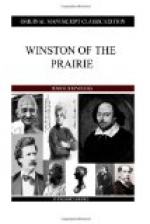As compared with the practice of insular Britain, there were not half enough of them, but wages are high in that country, and the crew of the thrasher paid by the bushel, while the rest had long worked for their own hand on the levels of Manitoba and in the bush of Ontario, and knew that the sooner their toil was over the sooner they would go home again with well-lined pockets. So, generously fed, splendid human muscle kept pace with clinking steel under a stress that is seldom borne outside the sun-bleached prairie at harvest time, and Winston forgot everything save the constant need for the utmost effort of body and brain. It was even of little import to him that prices moved steadily upward as he toiled.
At last it was finished, and only knee-high stubble covered his land and that of Maud Barrington, while, for he was one who could venture fearlessly and still know when he had risked enough, soon after it was thrashed out the wheat was sold. The harvesters went home with enough to maintain them through the winter, and Winston, who spent two days counting his gain, wrote asking Graham to send him an accountant from Winnipeg. With him he spent a couple more days, and then, with an effort he was never to forget, prepared himself for the reckoning. It was time to fling off the mask before the eyes of all who had trusted him.
He had thought it over carefully, and his first decision had been to make the revelation to Colonel Barrington alone. That, however, would, he felt, be too simple, and his pride rebelled against anything that would stamp him as one who dare not face the men he had deceived. One by one they had tacitly offered him their friendship and then their esteem, until he knew that he was virtually leader at Silverdale, and it seemed fitting that he should admit the wrong he had done them, and bear the obloquy, before them all. For a while the thought of Maud Barrington restrained him, and then he brushed that aside. He had fancied with masculine blindness that what he felt for her had been well concealed, and that her attitude to him could be no more than kindly sympathy with one who was endeavoring to atone for a discreditable past. Her anger and astonishment would be hard to bear, but once more his pride prompted him, and he decided that she should at least see he had the courage to face the results of his wrong-doing. As it happened, he was given an opportunity, when he was invited to the harvest celebration that was held each year at Silverdale.
It was a still, cool evening when every man of the community, and most of the women, gathered in the big dining-room of the Grange. The windows were shut now, for the chill of the early frost was on the prairie, and the great lamps burned steadily above the long tables. Cut glass, dainty china and silver gleamed beneath them amidst the ears of wheat that stood in clusters for sole and appropriate ornamentation. They merited the place of honor, for wheat had brought prosperity to every man at Silverdale who had had the faith to sow that year.




